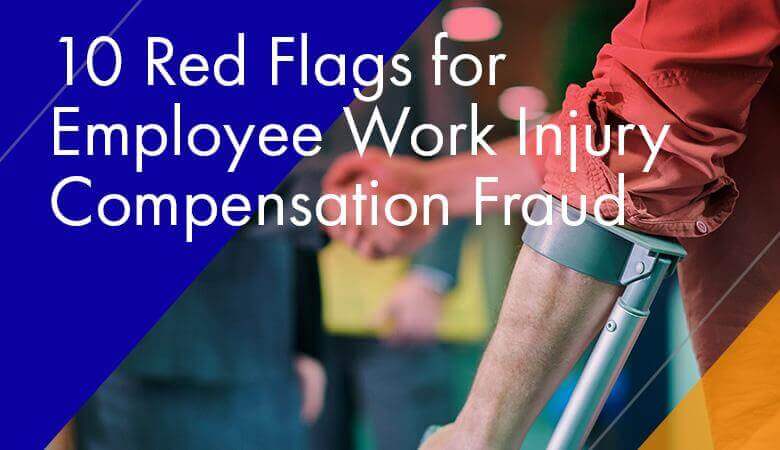10 Red Flags for Employee Work Injury Compensation Fraud
Workers’ Compensation claims are a pain; not just for the injured employee but for the employer, too, who must worry about liability, as well as the wellbeing of his or her team members. Fraudulent claims are a primary factor in driving up the cost of premiums for both employers and Team Members.
Having a clear plan of action for handling workers’ comp incidents will help to ensure claims success. Part of this plan should include identifying any red flags that could point to workers’ comp fraud and reporting them to an adjuster right away.
Check out these 10 warning signs that something might be amiss:
- The injury happened on Monday or Friday. Injuries that occurred early Monday morning before the supervisor or other employees arrived or on Friday afternoon but not reported until the next Monday, could be the result of weekend activities and not work-related.
- The employee is disgruntled. Is the employee unhappy? Was he or she recently demoted, passed over for a promotion, denied vacation or laid off? These could be motivators to commit workers’ comp fraud.
- There are no witnesses. This is especially suspect if the claimant typically works around others who most likely would have seen the incident. If the “witnesses” are all close friends of the claimant, this could also be a red flag.
- The facts are inconsistent. An injured employee should be able to describe the incident with clarity and consistency. If details are inconsistent or the claimant’s story changes frequently, this could be a red flag.
- The employee’s finances are shaky. An employee experiencing financial issues may see a worker’s comp claim as a way out.Check to see if the claimant is nearing retirement, going through a divorce or has taken a lot of time off before the injury. Also check to see if a spouse is receiving workers’ comp, disability or unemployment. Applying for social security benefits before the incident occurred or asking about an early settlement could all be red flags.
- The injury was reported late. Injured employees report their injuries right away, not days or weeks later.
- The employee can’t be reached at home. Can’t reach the injured employee at home when they are allegedly laid up or recovering? Is he or she really there? Maybe a visit to the claimant’s home might be in order. Also be wary of claimants who give a P.O. Box or friend’s address instead of their own.
- The employee has another job or participates in strenuous hobbies. A claimant who works two jobs or who participates in strenuous hobbies or sports may be trying to receive compensation for an injury that occurred elsewhere.
- The doctor or lawyer is suspect. Unfortunately some doctors and lawyers play the game and have reputations for involvement in false claims. Be wary of these characters and ask a trusted work comp pro if you have misgivings.
- The employee is over-eager. Employees who are pushing to settle the claim or have their lawyer date a letter of representation the day of or even before, the injury, could be up to no good.
Guarding yourself against employee worker’s compensation fraud is the first step toward preventing it. Remember to report the claim right away, document witness testimony, review any videotape you may have and report any suspicions to the adjuster right away.
At 4M, we believe that right is right and wrong is wrong. Fraud is wrong, and it’s illegal. We have a zero tolerance for fraud, and those who commit it will be prosecuted to the fullest extent of the law. It’s just another way we deliver the best, innovative, safe and sustainable solutions for your business. To learn more, give us a call or CLICK HERE to contact us.


